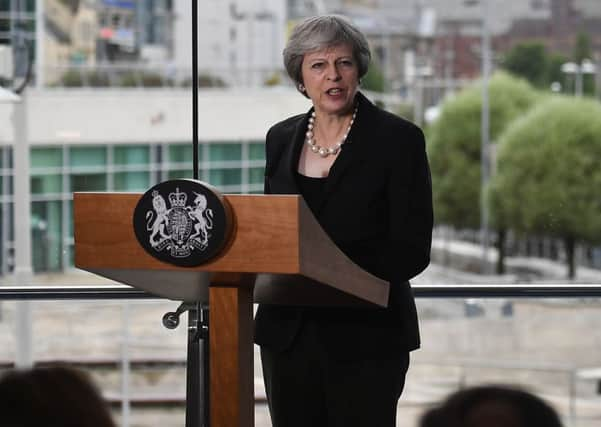PM claims '˜seamless border' central to Belfast Agreement '“ but it doesn't say that


The Prime Minister’s comments, made yesterday at the end of her two-day visit to Northern Ireland, have profound implications for the shape of Brexit because both the EU and the UK have agreed that it must respect the 1998 Agreement.
Speaking to a group of politicians, business leaders and other selected guests in Belfast’s Waterfront Hall, Mrs May said that in today’s Northern Ireland “any form of infrastructure at the border is an alien concept”.
Advertisement
Hide AdAdvertisement
Hide AdShe went on to say that “the seamless border is a foundation stone on which the Belfast Agreement rests, allowing for the ‘just and equal treatment for the identity, ethos and aspirations of both communities’.
“Anything that undermines that is a breach of the spirit of the Belfast Agreement – an agreement which we have committed to protect in all its parts and the EU says it will respect.”
But last night Lord Empey, one of the key Ulster Unionist negotiators of the Agreement, said that Mrs May’s comments about the “seamless border” – which are informing her entire Brexit policy – were founded on a false premise. He told the News Letter: “There’s nothing in the agreement that references any of that.”
Lord Empey, who receives the Conservative whip in the Lords, acknowledged that there would be significant problems flowing from any toughening of the border after Brexit, but said that the 1998 Agreement involved the acceptance by all sides that the border would remain, unless and until the people of Northern Ireland decide otherwise.
Advertisement
Hide AdAdvertisement
Hide AdHe added: “There are currently three borders – a fiscal border, a currency border and a constitutional border.”
Mrs May said in her speech that during the referendum campaign both sides “agreed that the border between Northern Ireland and Ireland must remain absolutely unchanged” and she said that “the notion of a hard border is almost inconceivable”.
She said that her “determination” not to see a hard border – which the UK and the EU have agreed extends to any infrastructure, even ruling out cameras – was central to how Brexit is being shaped for the whole UK.
And Mrs May was dismissive of the claims – mostly from Brexiteers – that some technological solution could enable the UK to sever ties with the EU but maintain an open Irish border.
Advertisement
Hide AdAdvertisement
Hide AdShe said: “No technology solution to address these issues has been designed yet, or implemented anywhere in the world, let alone in such a unique and highly sensitive context as the Northern Ireland border.”
Returning to the centrality of the border issue, she said: “Any agreement we reach with the EU will have to provide for the frictionless movement of goods across the Northern Ireland border.”
Seeking to reassure unionism – and her DUP partners – Mrs May also restated that she could “never accept that the way to prevent a hard border with Ireland is to create a new border within the United Kingdom”.
That also would be a breach of the spirit of the Agreement, and would represent a “threat to [the UK’s] constitutional integrity”.
Advertisement
Hide AdAdvertisement
Hide AdShe said that the European Commission’s proposed ‘backstop’ for Northern Ireland – the plan if no alternative can be agreed – would not preserve that integrity of the UK’s internal market.
The Prime Minister said that the implications of the backstop proposal would be that Northern Ireland “would be represented in trade negotiations and in the World Trade Organisation on tariffs by the European Commission, not its own national government”.
She added: “The economic and constitutional dislocation of a formal ‘third country’ customs border within our own country is something I will never accept and I believe no British Prime Minister could ever accept.
“And as MPs made clear this week, it is not something the House of Commons will accept either.”